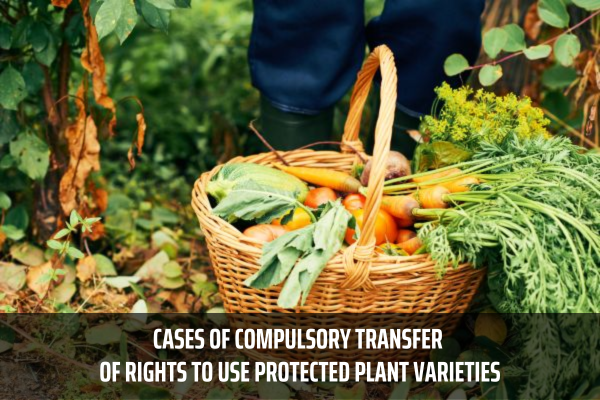What are cases of compulsory transfer of rights to use protected plant varieties in Vietnam from November 15, 2023?
- What are cases of compulsory transfer of rights to use protected plant varieties in Vietnam from November 15, 2023?
- What are the regulations on the competence in deciding on compulsory transfer of rights to use plant varieties in Vietnam?
- What are the regulations on bases and conditions for compulsory licensing of plant varieties in Vietnam?
What are cases of compulsory transfer of rights to use protected plant varieties in Vietnam from November 15, 2023?
On November 15, 2023, the Government issued Decree 79/2023/ND-CP on elaborating on several articles and implementation measures of the Law on Intellectual Property regarding rights to plant varieties.
Pursuant to the provisions of Article 21 of Decree 79/2023/ND-CP, cases of compulsory transfer of rights to use protected plant varieties include:
- Plant varieties are used for public purposes, non-commercial purposes, national defense and security, food and nutrition security for the people, or necessary needs of society in case of natural disasters, epidemics, wars, and widespread environmental pollution;
In case of using plant varieties, the Ministry of Agriculture and Rural Development of Vietnam shall disclose the requirements for the plant varieties, including the names, purposes, amount of varieties to be used, scope, and time for meeting the requirements for transfer purposes, and the time limit for application submission for organizations and individuals wishing to use such plant varieties to carry out the registration.
- The person who has the capacity and wishes to use the related plant variety fails to reach an agreement with the plant variety right holder regarding the conclusion of a contract to use it after 12 months of negotiations (excluding cases of force majeure) over the reasonable price and commercial conditions;
- The plant variety right holder is considered to have committed anti-competitive acts banned by competition laws.

What are cases of compulsory transfer of rights to use protected plant varieties in Vietnam from November 15, 2023? (Image from the Internet)
What are the regulations on the competence in deciding on compulsory transfer of rights to use plant varieties in Vietnam?
Pursuant to the provisions in Article 20 of Decree 79/2023/ND-CP as follows:
Competence in deciding on compulsory transfer of rights to use plant varieties
1. The Ministry of Agriculture and Rural Development of Vietnam shall issue a decision on the compulsory transfer of rights to use a protected plant variety that is subject to types of agricultural, forestry, and aquatic plants.
2. The Ministry of Agriculture and Rural Development of Vietnam shall take charge and cooperate with the Ministry of Health of Vietnam in issuing decisions on the compulsory transfer of rights to use protected plant varieties for medicine production.
Thus, the competence in deciding on compulsory transfer of rights to use plant varieties of the Ministry of Agriculture and Rural Development of Vietnam is implemented according to the above regulations.
What are the regulations on bases and conditions for compulsory licensing of plant varieties in Vietnam?
Pursuant to the provisions of Article 195 of the Law on Intellectual property 2005 as follows:
Bases and conditions for compulsory licensing of plant varieties
1. In the following cases, the rights to use a plant variety may be licensed to another organization or individual pursuant to a decision of the competent State body defined in clause 1 of article 196 of this Law without permission from the protection certificate holder or his or her exclusive licensee (hereinafter referred to as the holder of the exclusive right to use the plant variety):
(a) The use of such plant variety is for the public interest and non-commercial purposes, or in service of national defence and security, food security and nutrition of the people or to meet other urgent social needs;
(b) The persons having the need and capacity to use such plant variety fail to reach agreement with the holder of the exclusive right to use such plant variety on the entry into a licensing contract though they have made best efforts within a reasonable period of time to negotiate a satisfactory price and commercial conditions;
(c) The holder of the exclusive right to use such plant variety is deemed to have conducted anti- competitive practices prohibited by the law on competition.
2. The holder of the exclusive right to use a plant variety may request termination of the use right when the bases for licensing stipulated in clause 1 of this article cease to exist and are unlikely to recur, provided that termination of such use right will not be prejudicial to the licensee.
3. The right to use a plant variety licensed pursuant to a decision of a competent State body must satisfy the following conditions:
(a) Such licensed use right is non-exclusive;
(b) Such licensed use right is limited within a scope and duration sufficient to attain the licensing objective, and is largely for the domestic market except for the case stipulated in sub-clause (c) of clause 1 of this article;
(c) The licensee must not assign the use right to another person, except where the assignment is made together with the transfer of the business establishment of the licensee, and the licensee must not sub-license to others;
(d) The licensee must pay adequate compensation to the holder of the exclusive right to use the plant variety, taking into account the economic value of such use right in each specific case and in compliance with the compensation rate bracket promulgated by the Government.
4. The Government shall specify cases of compulsory licensing of plant varieties and the compensation rate bracket stipulated in sub-clause (d) of clause 3 of this article.
Thus, the transfer of rights to use plant varieties is carried out according to the above bases and conditions.
LawNet